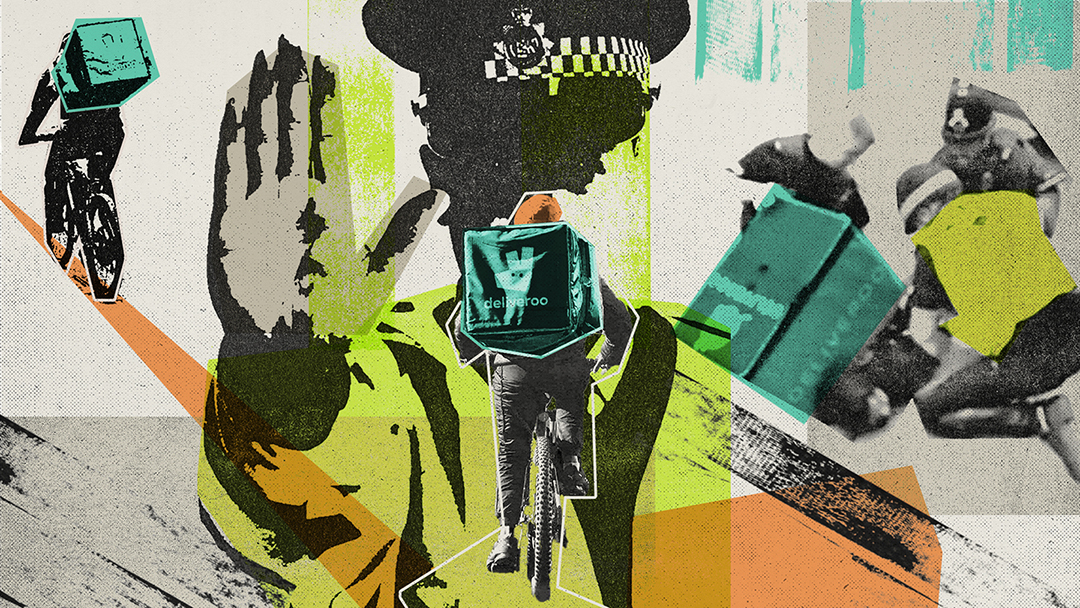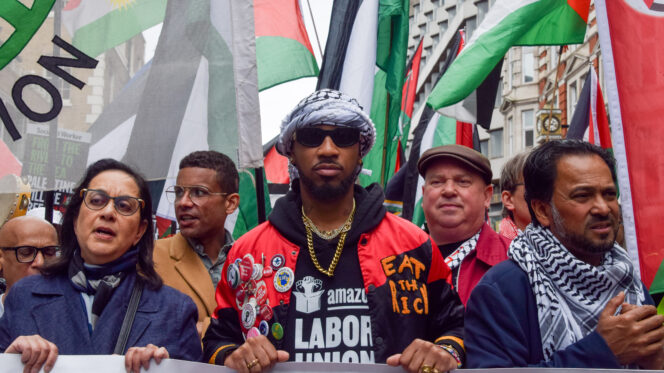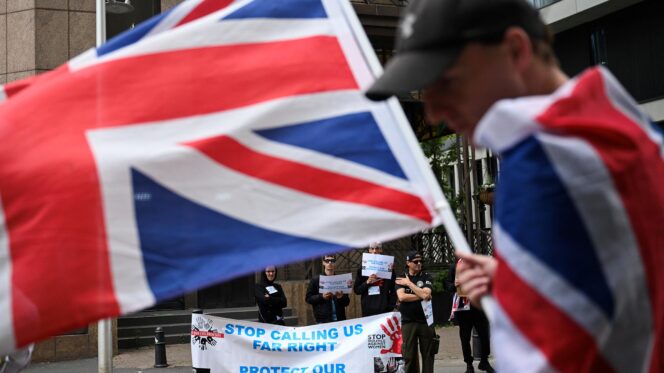‘I Live in Constant Fear’: Delivery Couriers Fight for Survival Amid Labour’s Immigration Blitz

Before setting off for work as a Deliveroo courier, 28-year-old Daniel has in recent months started reading the Bible. Lately, he’s been drawn to Psalm 91, where God promises to defend those who are faithful from harm. “A thousand may fall at your side, ten thousand at your right hand,” it says, “but it will not come near you.”
It’s not traffic accidents, angry customers or even far-right thugs Daniel prays for protection from. It’s border force agents. “I live in constant fear,” he said. “It’s anguish.”
For migrants with insecure legal status like Daniel, an asylum seeker from Brazil, food delivery platforms provide one of the relatively few forms of accessible and reliable employment, with quick onboarding processes and minimal English language requirements. As plummeting wages and collapsing working conditions have pushed other groups looking for a bit of extra cash, such as UK students, out of gig work, the country’s army of 83,000 food delivery riders has increasingly been made up of migrants otherwise shut out of the UK labour market.
Amid an increasingly frenzied national debate about who should be targeted for deportation, a right-wing obsession with food delivery couriers has seen the government single them out for removal.
Delivered by who?
In early July, home secretary Yvette Cooper ordered a “nationwide blitz” on delivery drivers whose immigration status means they do not have the right to work. Cooper announced that Labour would work in partnership with Just Eat, Deliveroo and Uber Eats to share data on the location of asylum hotels. The graphic accompanying the announcement on X/Twitter depicted a courier as a shadowy black silhouette, with the caption “Delivered by who?”
Since Cooper’s announcement, the streets have been crawling with police and immigration officers hoping to catch undocumented drivers.
A week-long crackdown between 20 and 27 July saw 1,780 drivers stopped, with over 280 arrested. The policing frenzy has produced grim scenes: in Holborn, a police officer handed a customer her McDonald’s order from the backpack of a courier he was in the middle of arresting.
Less dramatic but no less intrusive, as part of its delivery rider crackdown, Labour has also demanded that delivery platforms introduce more rigorous checks on riders’ right to work, restrict account sharing, and increase the frequency of facial recognition scans.
The right has been quick to take credit for Labour’s blitz. Shadow home secretary Chris Philp went as far as to claim that his exposure of “rampant illegal working” – including a video in which he made an unannounced visit to an asylum hotel to accost couriers – forced Labour to act. In an email to its mailing list, GB News hailed Cooper’s announcement, saying it came “after more than three years of GB News campaigning”.
Philp and GB News are far from the only people who have been ramping up the anti-delivery courier drumbeat in recent months. In June, a Sun reporter posed as an “illegal Channel migrant” to see how quickly he could rent an account and make a delivery. Rightwing student group Turning Point UK has started selling packs of stickers that call for a boycott of food delivery companies: “Don’t fund illegals. Don’t fund our replacement.” In July, The Spectator ran a cartoon depicting a small boat crossing, with a bearded man clutching a phone asking, “Are we there yet? I’ve got a food delivery order to pick up.”
Couriers now face a double threat. Not only targeted by immigration, but they are also forced to contend with the growing far-right threat. When in August one courier arrived to drop off an order at the Britannia Hotel in Canary Wharf, a site of anti-migrant protests, he was incorrectly assumed to be a resident working “illegally”. Swarmed by protestors, some wearing balaclavas, police had to escort him to safety.
The online food delivery industry is big business: in May, Deliveroo was bought out by American company DoorDash for £2.9bn, after the company reported its first full-year profit in March.
Platforms like Deliveroo have profited massively from migrant workers’ reliance on gig work: precarious workers are much less likely to protest their working conditions. But instead of going after the beneficiaries of exploitation by, say, levying hefty fines on companies caught allowing account subletting, the government is going after those being exploited.
As Deliveroo’s chief executive Will Shu attends drinks receptions at 10 Downing Street and sponsors panels at Labour’s annual conference, the migrant workers whose labour he profits from are afraid to do their jobs.
‘I did not come here to be a millionaire.’
I was introduced to Daniel by Helio, a Brazilian ex-courier turned Uber driver who works part time for the Independent Workers’ Union of Great Britain, a union fighting for gig economy workers.
We met Daniel in a car park on the outskirts of West London, where he’d been installing desks in a new office complex. Carrying a white hard hat and a pack of pink ring doughnuts that he immediately offered around, we drove for over an hour talking about his life.
Short and softly spoken, he shows me pictures of life back home: him riding a horse, or wearing a red and white Flamengo jersey, his beloved Rio de Janeiro-based football club. Now living in north London, we discussed whether he’ll be an Arsenal or Tottenham fan.
Daniel spoke to me in Portuguese via a translator, Helio, as well as in English, which he’s learning. He came to London in 2024 from the rural north of Brazil. Apart from time spent in the church choir as a child, he spent most of his life in Brazil working: starting aged 14, he had stints at an LED factory, doing distribution for supermarket chain Pão de Açúcar, and working in a local store. The eldest of six siblings, and with an alcoholic father, Daniel has always been a role model for his family, and felt it was his responsibility to improve their lives. He came to the UK with his wife; they’ve since divorced.
“In Brazil, we were always short on money. It was so difficult,” he said. “I did not come here to be a millionaire. I came to change my life and help my family.”
Having overstayed his tourist visa, Daniel started working as a courier after hearing it was well-paid and easy to get started. He knew he was putting himself at risk by working.
The trouble he got from the police started small, then grew. The police would stop him for routine questions over motorbike insurance. Then they impounded his motorbike, then again. Still, they’d never asked about his right to work – until earlier this year.
In February, Daniel was stopped in east London. Unlike the other times, when the police simply let him go, he was taken to a police station, then to Harmondsworth, an immigration removal centre close to Heathrow airport. The arresting officer “didn’t allow me to speak with anyone, not even to call my family,” he said.
Conditions at Harmondsworth – the largest site of its kind in Europe – were described last year as “truly shocking” by the prisons inspectorate, which said they were the worst it had ever seen.
The heat in the detention centre, which Daniel described as “like a sauna,” gave detainees frequent nosebleeds. When he complained of intense spinal pain, he wasn’t given access to a doctor, only over-the-counter painkillers. Internet access was restricted, leaving him struggling to contact family or research the labyrinthine immigration system he’d found himself caught in.
Weeks stretched into months. “I had no faith or belief that I would come out of that prison again,” he told me. Then, after three months, the Home Office accepted his appeal to be considered for asylum and released him, with only enough money to purchase a return ticket to his last known address.
Scenes like this are playing out on street corners across the country. Videos, often taken by other couriers, reveal a pattern: riders are pulled over for what begins as a routine vehicle or insurance check, before asking questions about immigration status. Those unable to answer are then taken to police stations; some are then taken on to immigration detention centres.
While immigration crackdowns on other industries that rely heavily on undocumented workers – such as carwashes, nail salons, restaurants, agriculture, elderly care and construction – involve resource-intensive workplace stings, immigration can pick off couriers – highly visible with their wearing bright orange and blue branded food insulation bags – one by one from the street. Bike checks provide a handy pretext.
There’s consensus among couriers and trade unions that workers who register on a platform using a pedal bike will be deprioritised for orders, as they’re deemed too slow by the platforms. Riding a motorbike or moped makes couriers vulnerable to police stops to check insurance. E-bikes, then, have tended to be regarded as the safer option. But now police are clamping down on those, too, partly since those that don’t require you to pedal are currently banned in the UK.
In a preview of the crackdown to come, Labour released footage in February of men surrounded by border force staff being led up the stairway of a charter jet to be deported.
For the most part, however, Labour’s immigration operations haven’t – so far – been conducted with the performative aggression of Trump’s border agents. That may be tactical.
Trade unions, legal campaigners, and couriers told me that the absence of spectacle doesn’t stem from humanitarian concerns for migrants caught up in the chaos, but from an awareness that the more public the raid, the more likely it is to trigger resistance from the community. The more casually police can snatch migrants off the streets, as they did with Daniel, the more easily they can get away with it.
‘He’s exploiting me and helping me.’
Daniel has no right to work while he waits for a decision on his asylum application. But receiving no support from the state, he soon found himself with no choice but to return to delivery work, knowing full well it could jeopardise his asylum application.
Not legally permitted to work, Daniel rents a Deliveroo account from another rider with access to a legitimate account – a widespread practice on delivery platforms. For this, he pays the accountholder £120 a week. Accounts on other platforms go for cheaper but guarantee less work.
To afford his Deliveroo account, plus the £100 a week for motorbike rental – £880 a month in total – Daniel does 10- to 15-hour days, seven days a week. This includes working a second job in construction.
“People hear ‘Oh, illegal immigrants are here, making a lot of money,’” Daniel told me. “But they don’t see the hours that we work, the situations that we have to go through with customers. They don’t see the blazing sun, or rain, or the conditions that we work in.”
Daniel says his relationship with the Deliveroo account owner is complicated. “He’s exploiting me and helping me. If I don’t get work, I still have to pay him. But if I give him back the account, I may not get another one. It’s tough, but delivery work is just better than other work.” Plus, the guy has never disappeared without paying him, or randomly pocketed a portion of his wages, as he’s heard sometimes happens.
While account-sharing is a general feature of the gig economy, the right for registered couriers to subcontract deliveries is particular to the UK. In 2023, the supreme court ruled that, unlike Uber drivers, who are workers, Deliveroo riders were self-employed and therefore ineligible for basic employment protections like the minimum wage.
The reason for this decision was based on the existence of a “substitution clause” that allows riders to dispatch another courier to work in their place. In a paper on migrant workers, researchers from the University of Birmingham said that the very legal loophole “once used to legitimise flexibility has since become a lightning rod for political debate and regulatory intervention.”
“The migrant is the engine of this country,” Daniel said, “but the current law treats migrants as criminals. Those who simply want to work and contribute to the country are forced to live illegally.”
He suggests the government allow asylum seekers to pay a fee that enables them to register to work legally, or allow those working without settled status to open their own delivery accounts. “What we ask for is not a privilege. It’s just a chance to live with dignity and without fear.”
Josh works at a local motorbike repair shop in east London where delivery drivers often have their vehicles serviced, and asked not to be named in full for fear of professional consequences. Speaking to Novara Media, he said he saw the government’s desire to address people working without the right to do so, but that people needed to work: “There’s two sides. They [undocumented workers] are in the wrong, because it’s not like they should be here. At the same time, the persecution should be done in an appropriate way. Most of the time, they don’t really have any other choice.”
He recounted the story of a courier he knew: “They just went into his house and pulled him out of there and took him to an immigration detention centre. They just forced him out. He can’t [speak English], so he didn’t know what was going on.” Although he was eventually let out, Josh says the courier now struggles to sleep at night.
Tensions among delivery riders run along several lines. There are racial ones – once dominated by Brazilians, food delivery drivers are now increasingly Bangladeshi. Then there are divisions between those with the right to work and those without. There are complaints from documented delivery drivers that undocumented workers hold down wages; from earlier migrants that newer arrivals drive dangerously, in turn drawing more scrutiny from police. Multiple couriers told me about drivers reporting each other to the Home Office, sometimes over disputes about unpaid account rent.
There are even tensions between earlier arrivals and newer migrants who feel misled into coming here. Over the phone, one Brazilian undocumented rider, who did not want to be named for fear of deportation, said that his anger was with his own community, who he said had heavily promoted the job on social media as a guaranteed means of steady employment, even of wealth. At its most extreme, drivers told me about attacks by workers who now find themselves trapped by low wages and debts racked up from their journey on fellow drivers who had, when the apps were more lucrative, encouraged others to travel to the UK to work in the gig economy.
But whatever the tensions among drivers, all are united in police scrutiny – even those with settled status. Stopping in at a bike shop frequented by couriers in Whitechapel, one Brazilian courier who spoke on the condition of anonymity said that couriers were being harassed regardless of their status. “It’s endless questions: ‘What are you carrying? Do you have the right to work? Can you show us your license?’” He said he himself had been stopped four times in the last month.
For all their many differences, one common element in delivery drivers’ lives is the ubiquity of police – a force even more oppressive since Labour’s latest crackdown. Leaving Daniel, I made my way to Stratford tube station. A few hundred metres from the station, I saw a courier sitting on the steps of some student accommodation, surrounded by police.
The same policing machine he was being sucked into has spat Daniel back out. Since his release from the immigration centre in May, Daniel has only been stopped by police once; they let him go without minimal questioning. “God’s hand is with me,” he said.
Polly Smythe is Novara Media’s labour movement correspondent.


